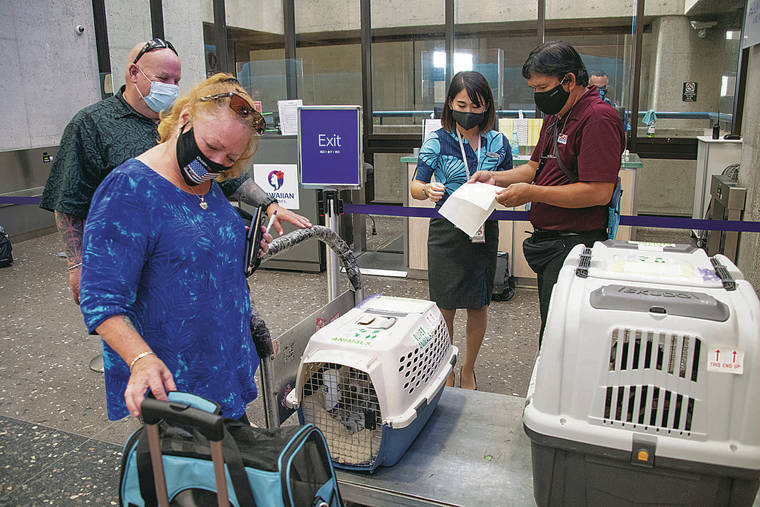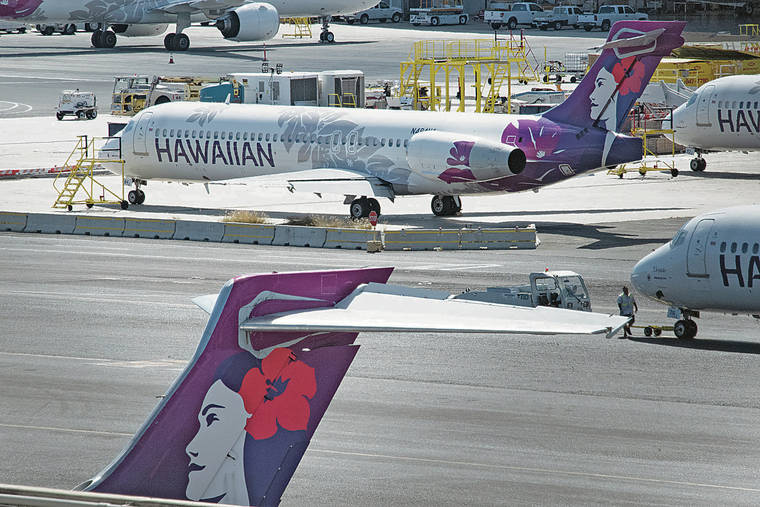Despite $420M loan, Hawaiian Airlines job cuts loom

CRAIG T. KOJIMA / CKOJIMA@STARADVERTISER.COM
Chizuru Watson, middle, of Hawaiian Air desk service, was helping Bryan and Kathy Tom get their pets to Kauai.

CRAIG T. KOJIMA / CKOJIMA@STARADVERTISER.COM
Hawaiian Air planes on the ground at Daniel K. Inouye International Airport.


Hawaiian Airlines got a lifeline worth up to $420 million on Tuesday from the Treasury Department, but the CARES Act loan alone won’t stave off the more than 2,500 job reductions that are anticipated at the state’s largest airline.
The Treasury Department announced Tuesday that United Airlines, American Airlines, Alaska Airlines, Frontier Airlines, JetBlue Airways Corp., and SkyWest Airlines also accepted the Treasury Department loans, which were authorized in the CARES Act to provide liquidity to eligible businesses that sustained losses from the coronavirus pandemic.
Hawaiian spokesman Alex Da Silva said the carrier appreciated the “Treasury’s work in finalizing our CARES Act loan, which allows us to borrow up to $420 million and provides a valuable source of liquidity during a period when we have had an estimated $3 million-per-day cash burn.”
Da Silva said the latest Treasury loan is separate from the CARES Act Payroll Support Program, “which has been a lifeline to support our frontline employees who continue to provide critical air transportation for the communities Hawaiian serves and the broader U.S. economy during the pandemic.”
“Unfortunately, given the prolonged and profound impact of this unprecedented crisis, more than 2,500 of our employees will be out of work starting Oct. 1, unless the PSP is extended,”he said. “We continue to advocate for a clean six-month PSP extension to give passenger demand an opportunity to recover from historic lows and ensure our employees remain prepared to increase our operations to support an economic recovery.”
The Associated Press reported that the U.S. Congress has been considering a second round of airline aid for weeks, but it’s hung up in the debate over a larger national relief package. The Airlines for America trade group told the Associated Press that a House proposal unveiled Monday raises some hope because Democrats and Republicans appear to be talking.
Don't miss out on what's happening!
Stay in touch with breaking news, as it happens, conveniently in your email inbox. It's FREE!
But in the absence of a deal, carriers like Hawaiian are tapping the Treasury loans, which are considered a last resort since they come with government restrictions.
According to a Tuesday news release from the Treasury Department, borrowers must meet CARES Act requirements, such as “maintenance of employment levels and limiting employee compensation, dividends, and share repurchases.”
Borrowers also must provide “warrants, equity interests, or senior debt instruments as appropriate taxpayer compensation.”
The Treasury Department on Tuesday did not provide details on loan amounts, which are capped at $7.5 billion apiece and may be finalized through today.
It’s hoped the loans will buy time for the airline industry, which is currently in crisis and anticipating a slow recovery. The Associated Press reported that the four largest U.S. airlines — Delta, United, American and Southwest — together lost $10 billion in the second quarter alone.
Hawaiian’s parent company, Hawaiian Holdings Inc., reported an adjusted second-quarter net loss, including CARES Act deductions and other changes, of $174.7 million, or $3.81 a share. Revenue fell to just over $60 million, a nearly 92% drop from the $712 million-plus that it realized in the second quarter of 2019.
“The second quarter was an incredibly challenging period for our company and for the entire industry as we continue to face the unprecedented demand destruction due to the COVID-19 pandemic,” Hawaiian President and CEO Peter Ingram said during the carrier’s second-quarter earnings call. “In our home state of Hawaii, we had a 14-day quarantine in place for incoming travelers throughout the quarter leading us to operate a fraction of the schedule that we planned at the beginning of the year.”
Hawaiian is gearing up for the Oct. 15 launch of a pre-arrivals testing program in Hawaii, which will allow travelers who meet government requirements to bypass the quarantine. On Friday, the carrier said it planned to partner with Worksite Labs to set up exclusive labs near Los Angeles and San Francisco international airports, with additional sites in other mainland gateway cities planned for the coming months.
The carrier will continue to cap cabin capacity at 70% through November to allow for onboard distancing. It’s also invested in a “Keeping You Safe” program, which offers frequent disinfecting of lobby areas, kiosks and ticket counters; electrostatic aircraft cabin spraying; Plexiglas barriers at staffed airport counters; and sanitizer wipe distribution to all guests.
Despite Hawaiian’s proactive stance, more troubles are expected to come Thursday after PSP ends. The industry has said that unless Congress extends the program as many as 50,000 jobs are at risk. Participating carriers, including Hawaiian, promised not to furlough or lay off employees until today.
On Thursday, Hawaiian is expected to have cut its pre-pandemic payroll by one-third, or 2,501 jobs.
Hawaiian projected that by Thursday its workforce will be 4,946, down from 7,447 employees.
Hawaiian’s planned reduction includes 1,850 union employees who volunteered to leave the company and 466 involuntary union cuts. These include flight attendants, pilots, machinists, reservation agents, dispatchers and other office workers.
That’s in addition to the 185 nonunion administrative positions that Hawaiian already had cut mostly by not filling vacancies and through voluntary separations.
Goodbyes have been trickling in for months from some of Hawaiian’s longtime employees.
Lola Hiatt, who worked as a flight attendant for Hawaiian for 53 years, talked about her bittersweet departure on the company’s video blog.
“In January I ended up taking my last flight. I didn’t know at that time that it was going to be my last flight. But COVID-19, once things went down the tubes, I said, ‘Well you know, this is finally my time,’” Hiatt said. “It’s a bittersweet way to leave because now I can’t go back and tell friends, staff members in the lounge, you know the junior kids, ‘Hey, it’s been fun flying with you guys — won’t be seeing anybody anymore after this.’”
Hiatt alternated between smiles and tears as she remembered better times at Hawaiian and expressed confidence in the carrier’s future.
“It was a means to enjoy the world, but actually working on the plane, working with people, you have to be a people person— truly that was the fun part of it too,” she said. “Hawaiian Air has been a fabulous company to work for and I believe in Hawaiian Air.”



